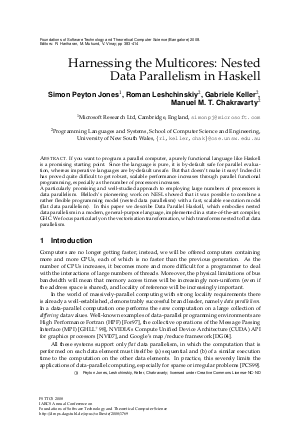Harnessing the Multicores: Nested Data Parallelism in Haskell
Authors Simon Peyton Jones, Roman Leshchinskiy, Gabriele Keller, Manuel M T Chakravarty
-
Part of:
Volume:
IARCS Annual Conference on Foundations of Software Technology and Theoretical Computer Science (FSTTCS 2008)
Part of: Series: Leibniz International Proceedings in Informatics (LIPIcs)
Part of: Conference: IARCS Annual Conference on Foundations of Software Technology and Theoretical Computer Science (FSTTCS) - License:
 Creative Commons Attribution-NonCommercial-NoDerivs 3.0 Unported license
Creative Commons Attribution-NonCommercial-NoDerivs 3.0 Unported license
- Publication Date: 2008-12-05
File

PDF
LIPIcs.FSTTCS.2008.1769.pdf
- Filesize: 0.56 MB
- 32 pages
Document Identifiers
Subject Classification
Keywords
- Nested data parallelism
- Vectorisation
- Haskell
- Program transformation
Metrics
- Access Statistics
-
Total Accesses (updated on a weekly basis)
0Document
0Metadata
Abstract
If you want to program a parallel computer, a purely functional language like Haskell is a promising starting point. Since the language is pure, it is by-default safe for parallel evaluation, whereas imperative languages are by-default unsafe. But that doesn\'t make it easy! Indeed it has proved quite difficult to get robust, scalable performance increases through parallel functional programming, especially as the number of processors increases. A particularly promising and well-studied approach to employing large numbers of processors is data parallelism. Blelloch\'s pioneering work on NESL showed that it was possible to combine a rather flexible programming model (nested data parallelism) with a fast, scalable execution model (flat data parallelism). In this paper we describe Data Parallel Haskell, which embodies nested data parallelism in a modern, general-purpose language, implemented in a state-of-the-art compiler, GHC. We focus particularly on the vectorisation transformation, which transforms nested to flat data parallelism.
Cite As Get BibTex
Simon Peyton Jones, Roman Leshchinskiy, Gabriele Keller, and Manuel M T Chakravarty. Harnessing the Multicores: Nested Data Parallelism in Haskell. In IARCS Annual Conference on Foundations of Software Technology and Theoretical Computer Science. Leibniz International Proceedings in Informatics (LIPIcs), Volume 2, pp. 383-414, Schloss Dagstuhl – Leibniz-Zentrum für Informatik (2008)
https://doi.org/10.4230/LIPIcs.FSTTCS.2008.1769
BibTex
@InProceedings{peytonjones_et_al:LIPIcs.FSTTCS.2008.1769,
author = {Peyton Jones, Simon and Leshchinskiy, Roman and Keller, Gabriele and Chakravarty, Manuel M T},
title = {{Harnessing the Multicores: Nested Data Parallelism in Haskell}},
booktitle = {IARCS Annual Conference on Foundations of Software Technology and Theoretical Computer Science},
pages = {383--414},
series = {Leibniz International Proceedings in Informatics (LIPIcs)},
ISBN = {978-3-939897-08-8},
ISSN = {1868-8969},
year = {2008},
volume = {2},
editor = {Hariharan, Ramesh and Mukund, Madhavan and Vinay, V},
publisher = {Schloss Dagstuhl -- Leibniz-Zentrum f{\"u}r Informatik},
address = {Dagstuhl, Germany},
URL = {https://drops.dagstuhl.de/entities/document/10.4230/LIPIcs.FSTTCS.2008.1769},
URN = {urn:nbn:de:0030-drops-17697},
doi = {10.4230/LIPIcs.FSTTCS.2008.1769},
annote = {Keywords: Nested data parallelism, Vectorisation, Haskell, Program transformation}
}
